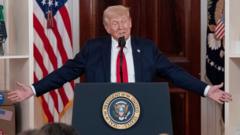In light of the US economy's 0.3% contraction, President Trump requested additional time to address economic issues, blaming his predecessor while promising significant investments to revitalize American manufacturing. Democrats criticized his narrative, underscoring ongoing partisan tensions surrounding economic management.
Trump Seeks More Time to Address Economic Challenges Amidst Recession Concerns

Trump Seeks More Time to Address Economic Challenges Amidst Recession Concerns
President Trump appeals for patience from business leaders as the US economy contracts for the first time in three years, attributing the downturn to previous administration policies.
President Donald Trump has called for more time to address the US economy's recent contraction, marking the first such decline in three years. Speaking to business leaders at a White House event, Trump attributed the downturn to decisions made by his predecessor, President Joe Biden, asserting that the 0.3% annual shrinkage reported by the Commerce Department is misleading due to companies stockpiling imports before his implementation of tariffs.
Despite the grim economic data, Trump highlighted a promise of $8 trillion in inward investment, which he believes will reinvigorate American manufacturing. This contraction follows a growth rate of 2.4% in the previous quarter, and public opinion polls reflect growing dissatisfaction with his administration's economic management as he approaches 100 days in office.
In his address, Trump pointed fingers at Biden, stating, "This is Biden's economy because we took over on January 20th," indicating a need for patience to see economic improvement. His remarks drew sharp criticism from Democratic leaders, including Congressman Hakeem Jeffries, who firmly stated, "This is not Joe Biden's economy, Donald; it is your economy," asserting accountability for the current economic landscape.
Trump also spotlighted potential investments in technology, healthcare, and infrastructure, while introducing several CEOs from major corporations, including Hyundai and Toyota. He called upon Congress to endorse his tax bill, which proposes significant tax cuts and spending reductions, yet faces opposition from both Democrats and some members of his party.
Earlier in the day, during a televised meeting with cabinet members, Trump downplayed concerns over shortages of imported goods. He suggested that rising costs may lead families to purchase fewer toys while remaining optimistic about potential reductions in tariffs. However, the escalating trade tensions, particularly with China, have caused a steep decline in import-export relations, raising fears of economic ramifications.
The imposition of tariffs, including a notable 10% on most imports along with steep levies on Chinese goods reaching as high as 245%, has sparked a trade war that complicates the economic landscape. As Trump navigates the complexities of his policies and their effects on the market, the question remains whether his strategies can effectively mitigate the receding economic indicators amidst ongoing partisan debates.























